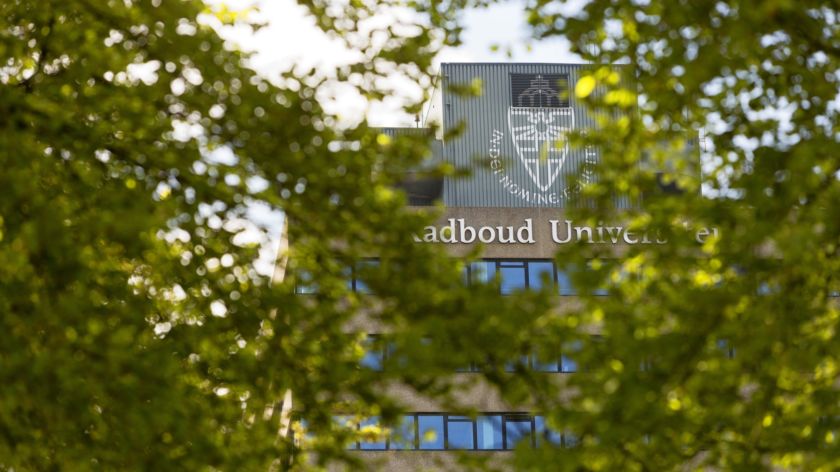Investigation complete: Paul Bakker will not become dean and is not welcome at the faculty for the foreseeable future
-
 Foto: Dick van Aalst
Foto: Dick van Aalst
Professor Paul Bakker has been banned from visiting the Faculty of Philosophy, Theology and Religious Studies in the next few months and will no longer be appointed dean. The Executive Board’s investigation into Bakker and social conduct within the faculty showed that he was guilty of ‘inappropriate behaviour’.
Professor Paul Bakker has been banned from teaching and from visiting the faculty during the current semester. The Executive Board announced its decision on Wednesday. This was a direct consequence of the investigation commissioned by the Executive Board into social conduct within the faculty of Philosophy, Theology and Religious Sciences (FFTR). Bakker was due to take office as the new dean in July, but the investigation threw a spanner in the works. Board member Wilma de Koning was not willing to disclose the exact nature of Bakker’s wrongdoing. ‘We have established that there was evidence of inappropriate behaviour and that is something that we regret for all those who were involved,’ she stated diplomatically. In any event, he is no longer eligible to be appointed dean.
According to De Koning, she is not able to elaborate any further on the matter, because those who are directly involved (including the accusers) have indicated that they do not wish the details to be disclosed. She also stated that they would like to remain anonymous. ‘And we respect that,’ she said. The investigation report, which was prepared by the Berenschot management consultancy firm, would not be published for the same reason.
Subsequent investigation
The matter was raised in June when the Executive Board ordered that an investigation be conducted into social safety and social conduct within FFTR. At that time, the Board reported that ‘multiple claims about a number of people had been received from multiple sources.’ The executives were consequently not willing to specify whether the case involved sexual harassment or other forms of undesirable behaviour. Even now, De Koning has chosen not to comment. ‘All I can say is that the investigation has confirmed certain claims.’ She did not say whether the complaints had been made by students or staff members. ‘I would, however, like to express my admiration for the people who came forward.’ Assistance has been offered to all those involved.
The only name that has been mentioned is that of Paul Bakker, Professor of Medieval and Renaissance Philosophy. In answer to the question of whether he was allowed to stay on as professor, even though he has been banned from visiting the faculty for the next six months in both the physical and digital sense, she replied, ‘Yes, for the time being.’ De Koning explained that the fact that someone had ‘acted improperly’ did not provide a legal basis for terminating an employment contract. She added that there would also be a subsequent investigation as Berenschot’s investigation had raised new questions.
She also declined to reveal how many other people had been involved in the case, but did say that in-depth discussions had taken place with a number of these people. Whether or not this would be the end of the matter would also depend on the results from the subsequent investigation, said De Koning.
Small-scale faculty
In 2019, the faculty commissioned its own investigation into social safety at the faculty. This resulted in a report (which was not made public) and a plan of action. ‘We will now work together with the faculty to implement this plan,’ said De Koning. In a faculty staff member questionnaire that was carried out in 2018, 15.5 percent of the respondents also indicated that they had been subjected to undesirable behaviour. Of these percentage points, 5.6 pertained to sexual harassment.
The faculty’s current dean, Christoph Lüthy, previously told Vox that the FFTR was a small, close-knit faculty that provided in-depth, small-scale education. The familiarity that occasionally arose from this level of small-scaleness would most likely play a role in the investigation. ‘We often work on the basis of the master-journeyman system, which involves individual guidance. This can lead to socially insecure situations. There are no clear rules about what is and isn’t allowed.’
Wilma de Koning stated that clear rules were currently being developed. The university was already working on a new approach in response to the #MeToo discussion that took off a few years ago. This week, discussions would be held with the confidential advisors who were yet to be appointed. ‘As a university, we aim to provide a safe environment for all students and staff members.’
And she said that it is precisely for this reason that she was forced to withhold so much information. Anyone who reported misconduct on campus needed be able to rely on both anonymity and protection. ‘As the Executive Board, we want to be transparent about this matter, but the transparency that people expect is different from the transparency that we can provide.’
Paul Bakker informed us by telephone that he did not wish to respond to the investigation and the measures that had been taken by the Executive Board.
The Radboud University confidential advisors can be found here.



